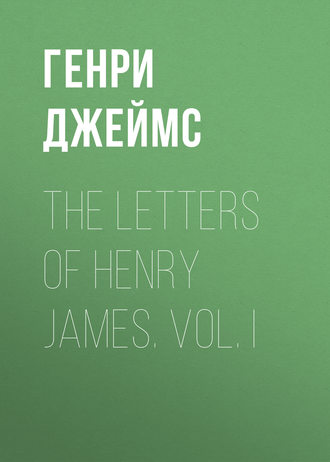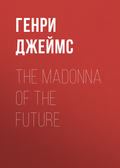
Генри Джеймс
The Letters of Henry James. Vol. I
To W. D. Howells
Strether's outburst to little Bilham, in Book V. of The Ambassadors, during their colloquy in the Parisian garden, represents the germ from which the novel sprang, and which H. J. owed, as he here tells, to Mr. Howells. The development of the subject from this origin is described in the preface afterwards written for the book.
Lamb House, Rye.August 10th, 1901.
My dear Howells,
Ever since receiving and reading your elegant volume of short tales—the arrival of which from you was affecting and delightful to me—I've meant to write to you, but the wish has struggled in vain with the daily distractions of a tolerably busy summer. I should blush, however, if the season were to melt away without my greeting and thanking you. I read your book with joy and found in it recalls from far far away—stray echoes and scents as from another, the American, the prehistoric existence. The thing that most took me was that entitled A Difficult Case, which I found beautiful and admirable, ever so true and ever so done. But I fear I more, almost, than anything else, lost myself in mere envy of your freedom to do, and, speaking vulgarly, to place, things of that particular and so agreeable dimension—I mean the dimension of most of the stories in the volume. It is sternly enjoined upon one here (where an agent-man does what he can for me) that everything—every hundred—above 6 or 7 thousand words is fatal to "placing"; so that I do them of that length, with great care, art and time (much reboiling,) and then, even then, can scarcely get them worked off—published even when they've been accepted.... So that (though I don't know why I inflict on you these sordid groans—except that I haven't any one else to inflict them on—and the mere affront—of being unused so inordinately long—is almost intolerable) I don't feel incited in that direction. Fortunately, however, I am otherwise immersed. I lately finished a tolerably long novel, and I've written a third of another—with still another begun and two or three more subjects awaiting me thereafter like carriages drawn up at the door and horses champing their bits. And àpropos of the first named of these, which is in the hands of the Harpers, I have it on my conscience to let you know that the idea of the fiction in question had its earliest origin in a circumstance mentioned to me—years ago—in respect to no less a person than yourself. At Torquay, once, our young friend Jon. Sturges came down to spend some days near me, and, lately from Paris, repeated to me five words you had said to him one day on his meeting you during a call at Whistler's. I thought the words charming—you have probably quite forgotten them; and the whole incident suggestive—so far as it was an incident; and, more than this, they presently caused me to see in them the faint vague germ, the mere point of the start, of a subject. I noted them, to that end, as I note everything; and years afterwards (that is three or four) the subject sprang at me, one day, out of my notebook. I don't know if it be good; at any rate it has been treated, now, for whatever it is; and my point is that it had long before—it had in the very act of striking me as a germ—got away from you or from anything like you! had become impersonal and independent. Nevertheless your initials figure in my little note; and if you hadn't said the five words to Jonathan he wouldn't have had them (most sympathetically and interestingly) to relate, and I shouldn't have had them to work in my imagination. The moral is that you are responsible for the whole business. But I've had it, since the book was finished, much at heart to tell you so. May you carry the burden bravely!—I hope you are on some thymy promontory and that the winds of heaven blow upon you all—perhaps in that simplified scene that you wrote to me from, with so gleaming a New England evocation, last year. The summer has been wondrous again in these islands—four or five months, from April 1st, of almost merciless fine weather—a rainlessness absolute and without precedent. It has made my hermitage, as a retreat, a blessing, and I have been able, thank goodness, to work without breaks—other than those of prospective readers' hearts.—It almost broke mine, the other day, by the way, to go down into the New Forest (where he has taken a house) to see Godkin, dear old stricken friend. He gave me, in a manner, news of you—told me he had seen you lately.... I am lone here just now with my sweet niece Peggy, but my brother and his wife are presently to be with me again for fifteen days before sailing (31st) for the U.S. He is immensely better in health, but he must take in sail hand over hand at home to remain so. Stia bene, caro amico, anche Lei (my Lei is my joke!) Tell Mrs. Howells and Mildred that I yearn toward them tenderly.
Yours always and ever,HENRY JAMES.
To Edmund Gosse
Lamb House, Rye.Sept. 16th [1901].
My dear Gosse,
I hurl this after you, there, for good luck, like the outworn shoe of ancient usage. Even a very, very old shoe will take you properly over Venice. I wrote a week ago to Mrs. Curtis about you, and you will doubtless hear from her, beckoningly, in respect to the ever-so-amiable Barbaro: an impression well worth your having. For the rest I commit you both, paternally, to Brown, to whose friendly memory I beg you to recall me. I wish I could assist at some of your raptures. Go to see the Tintoretto Crucifixion at San Cossiano—or never more be officer of mine. And, àpropos of master-pieces, read a thing called Venice in a thing called Portraits of Places by a thing called H. J., if you can get the book: I'm not sure if it's in Tauchnitz, but Mrs. Curtis may have the same. Brown certainly won't, though J. A. Symonds, in the only communication I ever got from him, told me he thought it the best image of V. he had ever seen made. This is the first time in my life, I believe, by the way, I ever indulged in any such—in any fatuous reference to a fruit of my pen. So there may be something in it. Drink deep, both of you, and come home remorselessly intoxicated, and reeking of the purple vine, to your poor old attached abstainer,
HENRY JAMES.
To Miss Jessie Allen
The "hideous American episode" was the recent assassination of President McKinley, on which Mr. Roosevelt succeeded to the Presidency. The "heavenly mansion" was the Palazzo Barbaro (referred to in the preceding letter to Mr. Gosse), where H. J. had stayed in company with Miss Allen.
Lamb House, Rye.September 19th, 1901.
Dear bountiful and beautiful lady!
It is equally impossible to respond to you adequately and not to respond to you somehow. You flash your many-coloured lantern, over my small grey surface, from every corner of these islands, and I sit blinking, gaping, clapping my hands, at the purple and orange tints to such a tune that I've scarce presence of mind left for an articulate "Thank you." How you keep it up, and how exactly you lead the life that, long years ago, when I was young, I used to believe a very, very few fantastically happy mortals on earth could lead, and could survive the bliss of leading—the waltz-like, rhythmic rotation from great country-house to great country-house, to the sound of perpetual music and the acclamation of the "house-parties" that gather to await you. You are the dream come true—you really do it, and I get the side-wind of the fairy-tale—which is more than I can really quite believe of myself—such a living—almost—near the rose! You make me feel near, at any rate, when you write me so kindly about the hideous American episode—almost the worst feature of which is that I don't either like or trust the new President, a dangerous and ominous Jingo—of whom the most hopeful thing to say is that he may be rationalized by this sudden real responsibility. Speriamo, as we used to say in the golden age, in the heavenly mansion, along with the ministering angel, long, long ago. And all thanks meanwhile for your sympathetic thought. It must indeed—the base success of the act—cause a sinking of the heart among the potentates in circulation. One wonders, for instance, just now, who is most nervous, the poor little Tsar for himself or M. Loubet for him. Let us thank our stars that we are not travelling stars, I not even a Loubet, nor you a Loubette, and that though we have many annoyances we are probably not marked for the dagger of the assassin.
20th, p.m. I had to break off last night, and I resume—perhaps a trifle precariously at this midnight hour of what is just no longer Friday, but about to be Saturday. I have seen, as it were, my two guests, and my tardy servants, to bed, and I put in again this illegible little talk with (poor) you! It has been a more convivial 24 hours than my general scheme of life often permits.... Such are the modest annals of Lamb House—or rather its daily and nightly chronicle. But don't let it depress you—for everything passes, and I bow my head to the whirlwind. But I hate the care of even a tiny and twopenny house and wish I could farm out the same. If some one would only undertake it—and the backgarden—at so much a year I would close with the offer and ask no questions. I may still have to try Whiteley. But I shall try a winter in town first. I blush for my meagreness of response to all your social lights and shadows, your rich record of adventures.... But it's now—as usual over my letters—tomorrow a.m. (I mean 1 a.m.) and I am, dear Miss Allen, very undecipherably but constantly yours,
HENRY JAMES.
To Mrs. W. K. Clifford
Lamb House, Rye.
Wednesday night.[Oct. 3, 1901.]
Dearest Lucy C.
I have waited to welcome you, to thank you for your dear and brilliant Vienna letter, because you stayed my hand (therein) from writing—for want of an address; and because I've believed that not till now (if even now) would you be disengaged from the tangled skein of your adventures. And even at this hour (of loud-ticking midnight stillness,) I don't pretend to do more than greet you affectionately on the threshold of home; promise you a better equivalent (for your so interesting, so envy-squeezing, so vivid record of adventure) at some very near date; and, above all, renew my jubilation at your having made so good and brave a thing of it all—especially as full and unstinted a one as you desired. Never mind the money, I handsomely say—you will get it all back and much more—in the refreshment and renewal and general intellectual ventilation your six weeks will have been to you. I'm sure the effect will go far—I want details so much that I wish I were to see you soon—but, alas, I don't quite see when. I'm just emerging from a domestic cyclone that has, in one way and another, cost me so much time, that, pressed as I am with a woefully backward book, I can only for the present hug my writing-table with convulsive knees. The figure doesn't fit—but the postponement of all joy, alas, does. My two old man-and-wife servants (who had been with me sixteen years) were, a few days ago, shot into space (thank heaven at last!) by a whirlwind of but 48 hours duration; and though the absolute rupture came and went in that time, the horrid accompaniments and upheaved neighbourhoods have represented a woeful interruption. But it's over, and I have plunged again (and am living, blissfully, for the present, with a house-maid and a charwoman, and immensely enjoying my simplified state and my relief from what I see now was a long nightmare).
I read your play in the Nineteenth Century, as you invited me, but I can't write of it now beyond saying that I was greatly struck by the care and finish you had given it. If I must tell you categorically, however, I don't think it a scenic subject at all; I think it bears all the mark of a subject selected for a tale and done as a play as an after-thought. I don't see, that is, what the scenic form does, or can do, for it, that the narrative couldn't do better—or what it, in turn, does for the scenic form. The inwardness is a kind of inwardness that doesn't become an outwardness—effectively—theatrically; and the part played in the whole by the painting of the portrait seems to me the kind of thing for which the play is a non-conductor. And here I am douching you on your doorstep with cold water. We must talk, we must colloquise and compare and renew the first moment we can, and I am all the while and ever your affectionate old friend,
HENRY JAMES.
To Miss Muir Mackenzie
Lamb House, Rye.Wednesday night. [Oct. 17, 1901].
Dear Miss Muir Mackenzie,
One almost infallibly begins—at least the perpetually criminal I do—with the assurance that one has, from long since, been on the point—! And it remains eternally true; which makes no difference, however, in your being bored to hear it. Besides, if I had been writing a month ago I shouldn't, perhaps, be writing now; and that I am writing now is a present joy to me—which I would barter for none other, no mere luxury of conscience. I haven't, for weeks, strolled through my now blighted and stricken jardinet without reverting gratefully in thought to you as its titular directress; without wishing, at once, that it were more worthy of you, and recognising, recalling your hand and mind, in most of its least humiliating features. Your kind visit, so scantly honoured, so meagrely recorded (I mean by commemorative tablet, or other permanent demonstration,) lives again in some of the faded phenomena of the scene—and the blush revives which the sense of how poor a host I was caused even then to visit my cheek. I want you in particular to know what a joy and pride your great proud and pink tobacco-present has proved. It has overlorded the confused and miscellaneous border in which your masterly eye recognised its imperative—not to say imperial—place, and it has reduced by its mere personal success all the incoherence around it to comparative insignificance. What a bliss, what a daily excitement, all summer, to see it grow by leaps and bounds and to feel it happy and hearty—as much as it could be in its strange exile and inferior company. It has all prospered—though some a little smothered by more vulgar neighbours; and the tallest of the brotherhood are still as handsome as ever, with a particular shade of watered wine-colour in the flower that I much delight in. And yet—niny that I am!—I don't know what to do with them for next year. My gardener opines that we leave them, as your perennial monument, just as they are. But I have vague glimmerings of conviction that we cut them down to a mere small protrusion above ground—and we probably both are fully wrong. Or do we extract precious seed and plant afresh? Forgive my feeble (I repeat) flounderings. I feel as the dunce of an infant school trying to babble Greek to Professor Jebb (or suchlike.) I am none the less hoping that the garden will be less dreadful and casual next year. We've ordered 105 roses—also divers lilies—and made other vague dashes. Oh, you should be in controlling permanence! Actually we are painfully preparing to become bulbous and parti-coloured. One must occupy the gardener. The grapes have been bad (bless their preposterous little pretensions!) but the figs unprecedently numerous. And so on, and so on. And it has been for me a rather feverish and accidenté summer; I mean through the constant presence of family till a month ago, and through a prolonged domestic upheaval ever since. I sit amid the ruins of a once happy household, clutching a charwoman with one hand, and a knife-boy—from Lilliput—with the other. A man and his wife, who had lived with me for long, long years, and were (in spite of growing infirmities and the darker and darker shadow of approaching doom) the mainstay of my existence, were sacrificed to the just gods three or four weeks ago, and I've picnicked (for very relief) ever since—making futile attempts at reconstruction for which I have had no time, and yet which have consumed so much of it that none has been left, as I began by hinting, for correspondence. I've been up to London over it, and haunted Hastings, and wired to friends, and almost appealed to the Grand Governess—only deterred by the fear of hearing from her that it isn't her province. Yet I did wonder if I couldn't lawfully work it in under kitchen-garden. No matter; my fate closes round me again, and the first thing I think of now when I wake up in the morning is that a "cook-housekeeper" in a Gorringe (?) costume (?) is to arrive next week. I tremble at her. If the worst comes to the worst I shall make you responsible. I walked over to Winchelsea this afternoon and returned, in darkness and wet, by the far-off station and the merciful train—always re-weaving the legend of your wet exile there. It blows, it rains, it rages to-night—for the first time here for six months. I hope you haven't had again to eat overmuch the bread of banishment. I haven't asked you for your news—have only jabbered my own; but I believe you not unaware that this is but a subtler art for extracting from you the whole of your herbaceous (and other) history. May it have been mild and merciful. Good-night—or, as usual, good-morning—I am going to bed, but it has been for some time to-morrow. Yours, dear Miss Muir Mackenzie, very gratefully and faithfully,
HENRY JAMES.
To Edmund Gosse
The reference in the following is to W. E. Henley's provocative article in the Pall Mall Magazine on Mr. Graham Balfour's recently published Life of Robert Louis Stevenson.
Lamb House, Rye.November 20th, 1901.
My dear Gosse,
I have been very sorry to hear from you of renewed upsets on quitting these walls—the same fate having, I remember, overtaken you most of the other times you've been here. I trust it isn't the infection of the walls themselves, nor of the refection (so scant last time) enjoyed within them. Is it some baleful effluence of your host? He will try and exercise next time some potent counter-charm—and meanwhile he rejoices that your devil is cast out.
All thanks for your so vivid news of the overflow of Henley's gall. Ça ne pouvait manquer—ça devait venir. I have sent for the article and will write you when I've read it. I gather from you that it's really rather a striking and lurid—and so far interesting case—of long discomfortable jealousy and ranklement turned at last to posthumous (as it were!) malignity, and making the man do, coram publico, his ugly act, risking the dishonour for the assuagement. That is, on the part of a favourite of the press etc., a remarkable "psychologic" incident—or perhaps I'm talking in the air, from not having read the thing. I dare say, moreover, at all events, that H. did very seriously—I mean sincerely—deplore all the graces that had crept into Louis's writing—all the more that they had helped it so to be loved: he honestly thinks that L. should have written like—well, like who but Henley's self? But the whole business illustrates how life takes upon itself to give us more true and consistent examples of human unpleasantness than expectation could suggest—makes a given man, I mean, live up to his ugliness. This one's whole attitude in respect to these recent amiable commemorations of Louis—the having (I, "self-conscious and alone") nothing to do with them, contained singularly the promise of some positive aggression. I have, however, this a.m., a letter from Graham Balfour (in answer to one I had written him on reading his book,) in which, speaking of Henley's paper, he says it's less bad than he expected. He apparently feared more. It's since you were here, by the way, that I've read his record, in which, as to its second volume, I found a good deal of fresh interest and charm. It seems to me, the whole thing, very neatly and tactfully done for an amateur, a non-expert. But, I see now that a really curious thing has happened, a "case" occurred much more interesting than the cas Henley. Insistent publicity, so to speak, has done its work (I only knew it was doing it, but G. B.'s book's a settler,) and Louis, qua artist, is now, definitely, the victim thereof. That is, he has superseded, personally, his books, and this last re-placement of himself so en scène (so largely by his own aid, too) has killed the literary baggage. Out of no mystery now do they issue, the creations in question—and they couldn't afford to lose it. Louis himself never understood that; he too publicly caressed and accounted for them—but I needn't insist on what I mean. As I see it, at all events, it's a strange little evolution and all taking place here, quite compactly, under one's nose.
I don't come up to town, alas, for more than a few necessary hours, till I've finished my book, and that will be when God pleases. I pray for early in January. But then I shall stay as long as ever I can. All thanks for your news of Norris, to whom I shall write. I envy your Venetian newses—but I myself have written for some. I rain good wishes on your house and am yours always,
HENRY JAMES.







